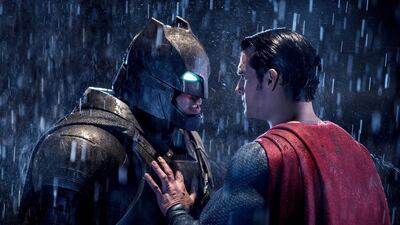I don’t know much about comic book superheroes, but I do know this: there are two main families – or what entertainment industry executives call “universes” – to keep track of.
One is the collection of superheroes from a company called DC Comics. These include Superman, Batman, Wonder Woman, and The Flash.
The other is Marvel, which encompasses The X Men, Spider-Man, Thor, and the Avengers.
There are people in the world – maybe you’re one of them, and if you are please excuse the slightly baffled tone I’m using – who really, really, really care about these two universes of superhero-dom, and who will argue endlessly and late into the night about which is more powerful, more imaginative, or more, well, super.
They don’t argue so much about which is funnier, because being funny isn’t really the point of superhero entertainment. Comic book heroes are designed to compete in outlandish trials and spout wooden dialogue, and once you open the window even slightly to allow a fresh breeze of humour to waft in, it’s hard to take a bunch of characters who parade around in colourful underpants and elaborate masks terribly seriously.
As these characters made their transition to the big screen, the creative minds at the helm of the DC Comics universe issued a subtle but unmistakable decree: no jokes. Keep the funny lines and wry takes out of the storylines and scripts. Play it as straight, and as safe, as you can.
Marvel, on the other hand, actively looked for ways to inject humour and irony into their projects, which included perhaps the most charming and witty superhero picture ever, Guardians of the Galaxy. That movie managed to rake in almost US$750 million (Dh2.75bn), and spawned a sequel with many more on the way.
Contrast that to DC’s Batman v Superman, which garnered more than US$800 million, but had no jokes. Both pictures cost about the same to make but the sullen, pompous quality of the DC picture hit audiences the wrong way and have thrown the studio’s plans for multiple sequels into panicked limbo.
To be fair, DC Comics was worried about the delicate nature of their intellectual property. The drawback of this approach is obvious to anyone who sat through the recent DC Comics movies. Batman v Superman is a ponderous and impossible-to-like picture, mostly because no-one utters a word of interesting or memorable dialogue. In other words, no one on screen is remotely funny.
I told you that so I could tell you this: I have a very talented writer friend who decided that his next script was going to tell the true story of his mother’s death from cancer.
I can see already that I’ve lost most of you, so let me rephrase that.
I have a very talented comedy writer friend who decided that his next script was going to tell the true story of his mother’s death from cancer. And to make it funny.
The snag here is obvious: cancer, like DC Comics, just isn’t funny. This is due to the fact that, mostly, people with cancer die sooner than people without cancer, and that’s a depressing thing to put on screen.
My friend’s mother, on the other hand, was a funny and irascible person – she elected, when diagnosed with terminal brain cancer, to spend her remaining few months meddling and arranging and correcting her children’s lives. Her theory, which was a solid-gold example of making the best of an awful situation, was that her time would be better spent finding a suitable husband for her unmarried daughter, preparing her son for his inevitable – to her, anyway – divorce, and teaching her grandchildren how to navigate their way through expensive and complicated restaurant meals, than it would be suffering through debilitating rounds of chemotherapy and radiation treatments.
The script my friend wrote was brilliant and absorbing and utterly original, but the network that commissioned it decided, in the last hour, not to move forward with production. Their point – and it’s not a terrible one – was that a series about a woman dying of brain cancer didn’t seem to have much comic potential.
My friend’s clever script now languishes in the pile of unproduced television scripts, cut down in its prime because the elderly heroine was heading for something unfunny and sombre. Cancer, according to the network executives who commissioned the script, just isn’t, and can’t be, funny.
But here’s the crucial tidbit: the script, somehow, was funny. Uproariously so, in parts. Sickness and death aren’t, by themselves, what one might call “laugh fests”, but they’re part of the human condition, they’re things we all grapple with at one time or another, and because of that, in the right hands, they’re hilarious.
It doesn’t take much to understand that point, but the executives who run DC Comics don’t seem to grasp that it’s the serious subjects, like death and cancer and Superman, that need the most wit and humour on screen.
Rob Long is a writer and producer in Hollywood
On Twitter: @rcbl

